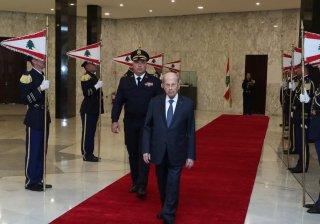Lebanese President Michel Aoun Retires, Leaving Office Vacant
While in office, Aoun presided over a series of major disasters, including the country’s financial meltdown and accompanying mass protests in 2019, the onset of the COVID-19 pandemic in early 2020, and the massive ammonium nitrate explosion at the Port of Beirut in August 2020.
Lebanese president Michel Aoun left office on Sunday on the penultimate day of his six-year term, returning to private life and leaving the country without a leader as its newly elected parliament struggles to form a government.
Aoun, now aged eighty-nine, led Lebanon from 2016 until 2022. An influential Maronite Christian leader within Lebanon’s confessional political system, he cut his teeth as a commander within the country’s army during the country’s civil war from 1975 until 1990. When the other parties signed the Taif Agreement in 1989, ending the war, Aoun refused to recognize the agreement and was forced into exile in France for fifteen years. After the withdrawal of Syrian troops from Lebanon in 2005, Aoun returned and formed the “Free Patriotic Movement; the following year, he aligned it with Hezbollah, the Iran- and Syria-aligned militant group and political party that many Lebanese believe is at the heart of the country’s recent turmoil.
While in office, Aoun presided over a series of major disasters, including the country’s financial meltdown and accompanying mass protests in 2019, the onset of the COVID-19 pandemic in early 2020, and the massive ammonium nitrate explosion at the Port of Beirut in August 2020. These events, and the perceived ineffectiveness of Aoun’s response to each, led the president’s approval rating among Lebanese to crater during the second half of his term in office. Some, however, have continued to support him, viewing him as a defender of Lebanon’s Christian population and arguing that he faced unprecedented challenges that were largely beyond his control.
In his final speech as president, Aoun voiced his dissatisfaction with incumbent Prime Minister Najib Mikati, who currently leads the country’s caretaker government until a new government is formed. Aoun insisted that Mikati be removed as prime minister-designate immediately, accusing him of attempting to remain in office in a caretaker capacity rather than supporting the formation of a new government and urging Lebanese MPs to “avoid [a] vacuum” at all costs. Parliament speaker Nabih Berri later told the pan-Arab Asharq al-Awsat newspaper that he would call a session of parliament to consider Aoun’s request within two days, adding that the election of a president to succeed Aoun was the country’s highest priority.
Mikati indicated in the run-up to Aoun’s departure that the caretaker government would continue to fulfill “all of its constitutional duties … in line with the constitution and other regulations.”
Under Lebanon’s constitution, a two-thirds majority vote in parliament is required to elect a president, meaning that both the March 8 Alliance and the March 14 Alliance, Lebanon’s two major political factions, must agree on the choice. Because the two factions are fiercely opposed, these elections are frequently deadlocked; before Aoun was elected as a compromise candidate in 2016, the office remained empty for two years, although then Prime Minister Tammam Salam fulfilled its duties in an acting capacity. However, unlike Salam, Mikati’s position as a transitional prime minister raises questions about the constitutionality of his acting on the president’s behalf.
Since mid-September, the Lebanese parliament has held four sessions to elect Aoun’s successor but has failed in each vote.
As he left office, Aoun claimed that Lebanon required “huge efforts” to escape from its current crisis—referring to the aftermath of a financial crisis, a devastating explosion, and recurring sectarian tensions.
“Without these efforts, we cannot put an end to our suffering,” Aoun said. “We cannot bring our country back on its feet. We cannot salvage Lebanon out of this deep pit.”
Trevor Filseth is a current and foreign affairs writer for the National Interest.
Image: Reuters.

